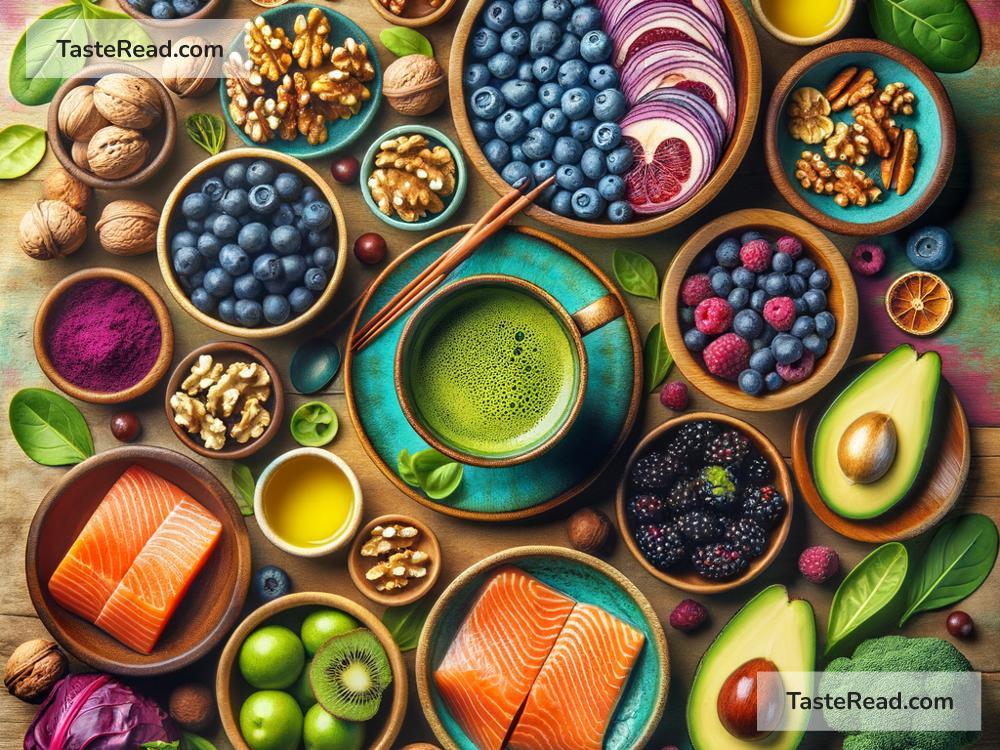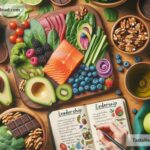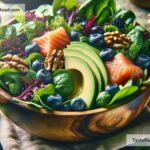Foods for Improving Learning: Smart Choices for a Sharp Mind
Do you ever wonder if the food you eat can affect how well you learn? The answer is yes! What you put on your plate has a big impact on your brain. Eating the right foods can help you focus, remember things, and think more clearly. In this blog, we’ll talk about some of the best foods for improving learning and why they are so good for your brain.
1. Fish: The Brain’s Best Friend
Fish like salmon, mackerel, and sardines are full of omega-3 fatty acids. These healthy fats are amazing for your brain. Omega-3s help your brain cells work better, which can lead to improved memory and focus. They also lower inflammation in the brain, keeping it healthy over time. If you can’t eat fish, you can try alternatives like flaxseeds, walnuts, or fish oil supplements.
2. Leafy Greens: Nature’s Power Plants
Veggies like spinach, kale, and broccoli are rich in nutrients like vitamin K, lutein, and folate. These nutrients help protect your brain cells and improve thinking skills. Leafy greens also contain antioxidants, which keep your brain safe from damage caused by free radicals. Adding a salad, steamed greens, or even a green smoothie to your meals can make a big difference.
3. Berries: Tiny Yet Mighty
Blueberries, strawberries, and blackberries are not just tasty—they are packed with antioxidants and vitamins. These little fruits are known to improve memory and learning by boosting communication between brain cells. Berries also lower stress in the brain, which helps you stay focused. Snack on berries, mix them into yogurt, or add them to oatmeal for a brain-friendly treat.
4. Nuts and Seeds: Crunchy Brain Boosters
Nuts like almonds, walnuts, and cashews, as well as seeds like pumpkin and sunflower seeds, are great for improving learning. They are filled with healthy fats, protein, and vitamins that keep your brain sharp. Walnuts, in particular, are full of omega-3s, which support brain health. A handful of nuts or seeds as a snack during study time is a simple way to fuel your brain.
5. Whole Grains: Steady Energy for Your Brain
Whole grains, such as brown rice, oats, quinoa, and whole-grain bread, provide steady energy for your brain. Unlike sugary snacks that cause energy crashes, whole grains release glucose slowly, keeping you energized for hours. They also have B vitamins, which are important for healthy brain function. Start your day with whole-grain cereal or toast for long-lasting focus.
6. Eggs: The Perfect Brain Food
Eggs are full of choline, a nutrient that helps your brain produce acetylcholine, a chemical that improves memory and learning. Eggs also provide protein and other important vitamins like B6, B12, and folate. Whether scrambled, boiled, or in an omelet, eggs make a smart choice for breakfast or lunch.
7. Dark Chocolate: A Sweet Way to Learn Better
Good news for chocolate lovers—dark chocolate can actually help your brain! Dark chocolate (with at least 70% cocoa) contains antioxidants and caffeine, which improve focus and brain functions. It also increases blood flow to the brain, helping with learning and memory. Remember to enjoy it in moderation, as too much chocolate can add unnecessary sugar.
8. Avocados: Creamy Brain Boosters
Avocados are packed with healthy fats that improve brain health. They help maintain healthy blood flow, which is crucial for learning and concentration. Avocados also contain vitamins like B6, which can improve mood and focus. Spread some avocado on whole-grain toast or toss it into a salad for a creamy and brain-boosting addition to your meal.
9. Green Tea: Sip Your Way to Better Focus
Green tea is known for its calming properties, but it also contains caffeine and an amino acid called L-theanine. This combination improves focus and helps you stay alert during long study sessions. Green tea also has antioxidants that protect your brain from stress. Swap your regular tea or coffee with green tea for a smarter beverage choice.
10. Yogurt: Gut Health Meets Brain Health
You might be surprised to learn that your gut and brain are connected. Eating probiotic-rich foods like yogurt can improve gut health, which in turn boosts brain function. Yogurt also contains protein and calcium, which support overall energy and mental performance. Pair it with berries or nuts for an extra brain-power boost.
Tips for Using Food to Learn Better
- Stay Hydrated: Your brain needs water to work well. Drink plenty of water throughout the day.
- Avoid Sugary Snacks: Sugar can give you a quick energy boost but will leave you feeling tired later. Choose healthier snacks instead.
- Eat Regular Meals: Skipping meals can leave you tired and unfocused. Eating regularly keeps your energy levels steady.
- Plan Ahead: Prepare brain-boosting snacks before study sessions to avoid reaching for unhealthy options.
Final Thoughts
Your brain is an incredible organ, and it deserves the best care possible. Adding these brain-friendly foods to your diet can help you learn better, focus more, and feel energized throughout the day. Remember, healthy eating isn’t just about improving grades or work performance—it’s about creating a strong foundation for lifelong learning.
So, next time you sit down to eat, think about your brain. Simple changes in your diet can make a big difference in how well you learn and perform. Choose wisely, and watch your brainpower grow!


